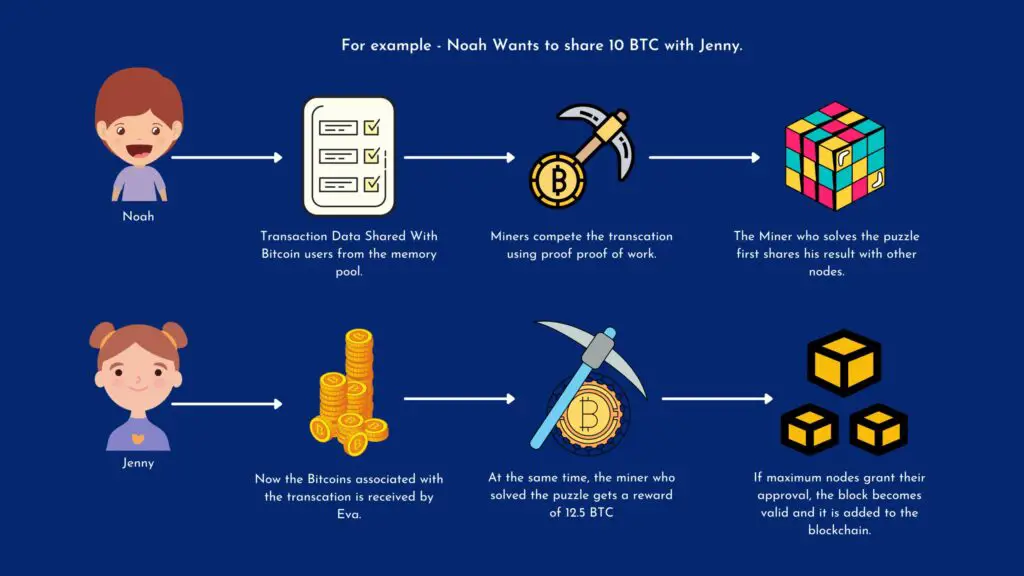Last Updated on May 1, 2023 by QCity Editorial Stuff
The amount of money that can be made mining Bitcoin varies based on several factors, including the cost of electricity, the efficiency of the mining hardware, and the current difficulty level of the Bitcoin network.
How Bitcoin Mining Works?

Bitcoin mining is the process of verifying and adding transactions to the blockchain, the decentralized ledger that records all Bitcoin transactions. Miners use specialized hardware and software to solve complex mathematical problems and compete with each other to be the first to validate a new block of transactions. Here are the main points on how Bitcoin mining works:
- Bitcoin mining is the process of adding new transactions to the blockchain, a decentralized ledger of all Bitcoin transactions.
- Miners use specialized hardware and software to solve complex mathematical problems and compete with each other to validate new blocks of transactions.
- When a miner successfully validates a block, they are rewarded with newly minted Bitcoins and transaction fees from the transactions included in the block.
- The mining process is essential to the security and integrity of the Bitcoin network, ensuring that all transactions are valid and that no one can double-spend or counterfeit Bitcoins.
- Each block contains a unique code called a hash, which serves as a digital fingerprint of the block. If any of the transactions in the block are altered, the hash will change, and the block will be invalidated.
- Mining difficulty is adjusted periodically to maintain a consistent rate of block creation, approximately every two weeks.
- The difficulty level is based on the total amount of mining power (hash rate) in the network. As more miners join the network and the hash rate increases, the difficulty level also increases to ensure that the block creation rate remains constant.
- The reward for mining a block is halved every 210,000 blocks, or roughly every four years, with the current reward being 6.25 Bitcoins per block.
- Bitcoin mining requires a significant amount of electricity, and the cost of electricity is one of the primary factors affecting the profitability of mining.
How Much Can You Make Mining Bitcoin?
The amount of money you can make mining Bitcoin depends on several factors, including those mentioned above. According to research, the average daily revenue per 1 TH/s of mining power is $0.40. This figure can vary depending on the mining difficulty, the hardware used, electricity costs, and Bitcoin price.
For example, suppose you have a mining rig with a hash rate of 100 TH/s. In that case, you can expect to earn around $40 per day in Bitcoin revenue (assuming a daily revenue per 1 TH/s of $0.40). This figure is before taking into account electricity costs and mining pool fees.
Factors Affecting Bitcoin Mining Profitability

The profitability of Bitcoin mining is affected by several factors, including:
- Hash rate: The total amount of mining power in the network affects the difficulty level of mining and, consequently, the profitability of mining.
- Mining difficulty: The difficulty level is a measure of how hard it is to find a valid hash for a new block. It adjusts every two weeks based on the total hash rate in the network.
- Bitcoin price: The price of Bitcoin affects the mining profitability since miners receive newly minted Bitcoins as a reward for validating blocks.
- Electricity cost: Mining requires a significant amount of electricity, and the cost of electricity varies widely depending on the region. Lower electricity costs can increase mining profitability.
- Mining hardware efficiency: The efficiency of the mining hardware being used affects mining profitability. More efficient hardware can mine more Bitcoins using the same amount of electricity.
- Transaction fees: Miners receive transaction fees from the transactions included in the block they validate. Higher transaction fees can increase mining profitability.
- Block reward: The block reward is the number of Bitcoins miners receive as a reward for validating a new block. The block reward is currently 6.25 Bitcoins per block and is halved every 210,000 blocks.
- Mining pool fees: Some miners join mining pools, which are groups of miners who combine their hash power to increase their chances of validating a block. Mining pool fees can reduce mining profitability.
Calculating Bitcoin Mining Profitability
There are quite a few ways you can calculate the Bitcoin mining profitability –
- Calculate the hash rate: The hash rate is the amount of mining power used to validate new blocks in the network. It is measured in hashes per second (H/s), or more commonly in mega hashes per second (MH/s), giga hashes per second (GH/s), or tera hashes per second (TH/s). The hash rate can be estimated based on the mining hardware being used.
- Determine the mining difficulty: The mining difficulty is the measure of how hard it is to find a valid hash for a new block. It adjusts every two weeks based on the total hash rate in the network. The current mining difficulty can be found on various websites that track Bitcoin statistics.
- Calculate the electricity cost: The cost of electricity is a significant factor affecting mining profitability. It can vary widely depending on the region, and it is typically measured in kilowatt-hours (kWh). The electricity cost can be estimated based on the electricity rate in the region and the power consumption of the mining hardware being used.
- Estimate the block reward and transaction fees: The block reward is the number of newly minted Bitcoins received by the miner for validating a new block. The current block reward is 6.25 Bitcoins per block, and it is halved every 210,000 blocks. Transaction fees are additional revenue received by miners for validating transactions included in the block.
- Calculate the mining profitability: The mining profitability can be calculated by subtracting the electricity cost from the revenue generated by mining (block reward + transaction fees). The revenue generated by mining can be estimated based on the hash rate, mining difficulty, and the estimated block reward and transaction fees.
Conclusion
Mining Bitcoin can be a profitable venture, but it requires a significant investment in powerful hardware and electricity costs. Mining difficulty, hardware, electricity costs, Bitcoin price, and mining pool fees are the main factors that affect Bitcoin mining profitability.
References:






